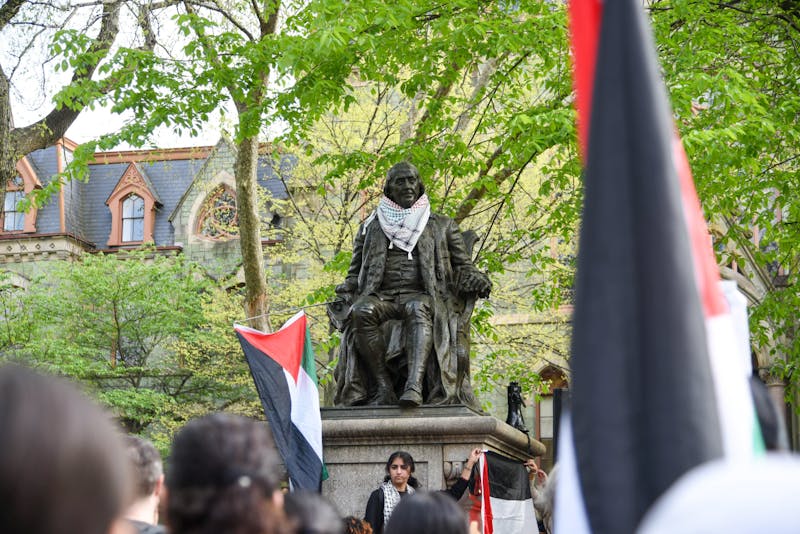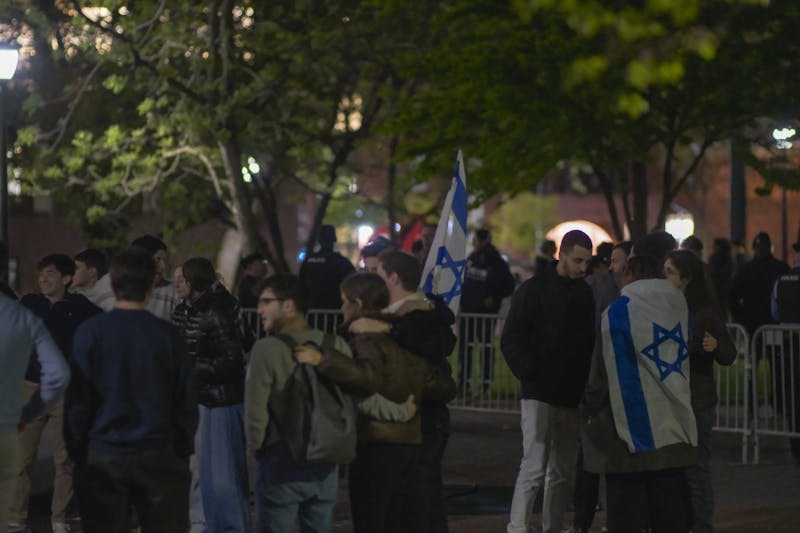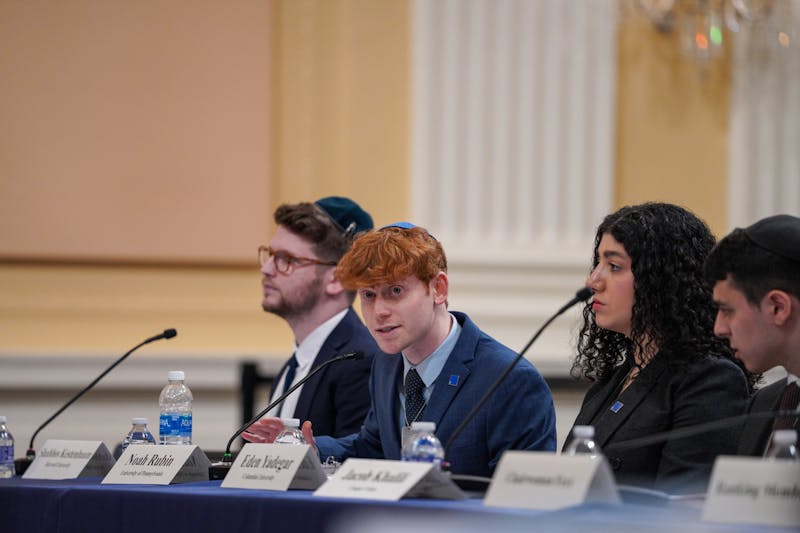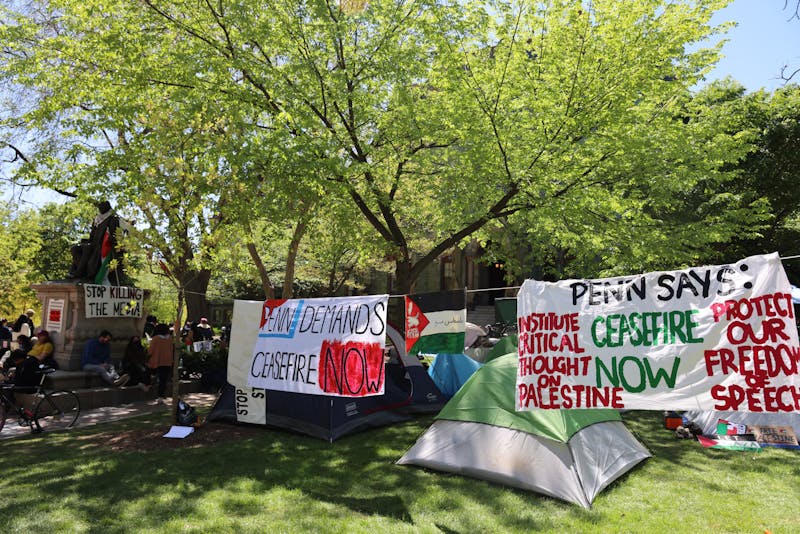
As night fell on the pro-Palestinian encampment which began on College Green on Thursday, participants prepared for the possibility of arrest and community members rallied in support of Penn's divestment from Israel's war in Gaza.
Organizers had laid down approximately 20 tents, as well as sleeping bags and blankets, by early Friday morning, with some wary of an additional police response as the demonstration continued into the evening. The encampment began amid a rally of hundreds of Penn students, faculty, and Philadelphia community members in support of Palestinians — the culmination of a citywide march that originated at Philadelphia's City Hall and converged on campus with a walkout by a group of Penn faculty.
The demonstration, which organizers called the "Gaza Solidarity Encampment," arrived after days of rising tensions across the University, which in the past week suspended Penn Students Against the Occupation of Palestine and faced dueling referendum proposals on its ties to Israel.
While spectators filled Franklin Field for the Penn Relays and Interim Penn President Larry Jameson held a listening session seeking to address the campus environment, between 50 and 60 protestors rushed onto College Green to lay down tarps and set up tents amid chants of “the more they try to silence us, the louder we will get.” Other protestors formed a circle around the tents, linking arms and chanting, “the students, united, will never be defeated.”
For half an hour, speakers — including two professors and one Penn student — stood in the shadow of a Ben Franklin statue draped in keffiyehs, leading the crowd in chants against Israel’s treatment of Palestinians.
The University responds
In a statement to The Daily Pennsylvanian, a University spokesperson said that Penn was "closely monitoring" the pro-Palestinian encampment on College Green and pledged that protestors would face "consequences" for actions that violate University policies or the law.
"We respect and support the rights of our community members to protest peacefully and in keeping with University policy by which we all agree to abide," the spokesperson wrote. "However, the right to free expression and to protest on our campus is not and can never be absolute."
The University also outlined what conditions will prompt it to respond to the encampment.
"We will not permit protest and speech when it devolves into words and actions that violate Penn’s policies, disrupt University business, or contribute to an intimidating, hostile, or violent environment on our campus," the spokesperson wrote. "Safety is our top priority, and there will be consequences for actions that are not permitted by University policies or local, state, or federal law."
Penn engaged in several precautions Thursday morning in advance of the protests on campus, including closing the Spruce Street entrance to Houston Hall and placing barricades adjacent to the Split Button and outside Perry World House, where Jameson was holding a listening session with community members.
Faculty walkout, city-wide march converge with encampment
One faculty walkout participant, history professor Eve Troutt Powell, described Israel’s attacks on Gaza as “scholasticide" in her remarks to the crowd.
“No wonder donors like Marc Rowan hate the humanities," Powell said, referring to the donor and 1985 Wharton graduate who led the movement to oust former Penn President Liz Magill in December. "They have bought into the idea that universities are creating well-dressed cogs who function best in only the corporate world.”
Powell is also one of the plaintiffs in an ongoing lawsuit against Penn seeking to prevent the handover of requested documents to Congress.
Dagmawi Woubshet, an organizer for Penn Faculty for Justice in Palestine and English professor, said that he estimated that "several dozen faculty members" were present at the protest.
He outlined the three demands of the faculty walkout in a speech, including calling for the University to disclose investments, divest from Israeli institutions involved in the "genocide in Gaza," and ensure students are not "unduly targeted."
Woubshet described himself as "heartened by the moral courage of and clarity of [Penn] students," and said that students should be "supported" and not "targeted.”
An unnamed Palestinian student who identified themselves as a Penn student said that University administration has created a “hostile environment” for Palestinian students and drew a contrast to campus policies to combat antisemitism and protect Jewish students.
“What makes us less deserving of that protection? What makes us any different from our peers?” she said. “Do we not deserve to feel safe and protected and supported by a community which we have committed our time, money, and education to?”
After setting up the encampment, Muslims from the group gathered for prayer, assembling prayer mats on the path leading up to College Hall.
On Thursday afternoon, PAO and other groups released a statement on Instagram announcing that the encampment was organized in solidarity with PAO and outlining three demands to the University. The statement called for Penn to disclose its financial holdings under the Associated Investments Fund, divest from Israeli corporations and institutions, and defend Palestinian students.
“Most importantly, this encampment is organized in solidarity with the people in Gaza and Palestine, who are currently enduring over 200 days of genocide and over 75 years of occupation and apartheid, which the University of Pennsylvania is shamefully complicit in,” the statement read.
Pro-Israel counterprotestors criticize encampment
A small group of pro-Israel counterprotestors gathered on the opposite side of College Green from the encampment, holding up a flag of Israel. The encampment was "disgraceful," counterprotester and College junior Joseph Hochberg told the DP — adding that he was there to show his support for Israel and Jewish people.
“I think that it’s possible to call for human rights for Palestinian people without calling for violence against Jews and without calling for the erasure of Israel,” he said.
Hochberg said that he believed the National Guard should be involved when Jewish students are “being targeted.”
In a statement to the DP, College senior Eyal Yakoby wrote that the University of Southern California recently cancelled its graduation ceremony due to “disruptive behavior” similar to the behavior on Penn’s campus.
“If you are a student who wants to attend classes without being overwhelmed by mobs, or if you are concerned about the possibility of our graduation being cancelled, you should recognize how these violent protests are fundamentally opposed to Penn’s primary mission of education,” he said.
Organizers at Penn join nationwide protest movement
Speaking from the Ben Franklin statue, organizers expressed solidarity with other student protestors across the nation. A member of Penn's chapter of the American Association of University Professors addressed the crowd, and a Jewish Penn student recited several poems about Palestine.
A Freedom School for Palestine affiliate urged the crowd to “not fall for the ways these institutions try to unravel our bonds.”
“They fear us because our solidarity is not a dimly lit candle that can be blown out with a couple of challenges,” the speaker said.
During the rally, Division of Public Safety officers closed the entrance to College Hall and instructed people to stay off the steps.
At least 16 Philadelphia Police vehicles and six vans parked along 34th Street near Fisher Fine Arts Library on Thursday evening. Protestors temporarily paused activities around 8 p.m. after an announcement to the crowd due to heightened police presence, before resuming speeches around 20 minutes later.
As night fell on campus, speakers outlined “know your rights” protocols to prepare protesters for potential arrests. The speakers said that there is a hotline to support protesters and encouraged them to fill out forms with their legal names and dates of birth so that they can be located. A speaker also told protesters to “invoke their right to remain silent” if a police officer detains them.
Protestors engaged in various chants throughout the day, including "Long live the intifada," "There is only one solution, intifada revolution," "From the river to the sea Palestine will be free," and "You wanna know what we say about Israelis? They're pigs."
Several Penn community members who attended the rally expressed varying viewpoints on student activism and the University's role in how it responds to dissent.
"This is as essential as any class you might take," Penn Medicine assistant professor Elinore Kaufman said. "Participating in the most important issues of our time, learning how to take part in protests, take part in dissent, and take part in discussions is an essential part of the mission of the University, and what we should be supporting at Penn."
Austin Svedjan, a doctoral student and Hamilton-Law Graduate Fellow in the Department of English, criticized a perceived change in Penn's academic experience over the past two years — even though they did not personally feel “hostility” to their work by administrators or faculty.
“While the University is naming itself explicitly in support of getting antisemitism off campus, it kind of just strikes me as a larger dog whistle against politically motivated thought-work that happens on this campus,” Svedjan said.
The protest attracted a wide variety of activist groups, including the Socialist Alternative, which tabled on College Green on Thursday and collected signatures for a ceasefire petition.
A first-year Penn student and Socialist Alternative political activist, who asked to be anonymous, said that members of the organization will not participate in the encampment but would be present throughout its duration to support participants.
Local politicians stand by rights of protestors
Local politicians also stood by demonstrators' decision to lead an the encampment, speaking with the DP about the importance of peaceful protest.
“I support students protesting and marching to call attention to the war on Gaza,” Pennsylvania state Rep. Rick Krajewski (D-Philadelphia), who represents Penn in the state legislature, said. “And that’s why I’m here in solidarity.”
State Sen. Nikil Saval (D-Philadelphia) and state Rep. Tarik Khan (D-Philadelphia), both of whom were present at the encampment, said they were “here to listen.”
“What I’ve heard is [the encampment] stems from peace and students wanting peace, and just also to make sure that they’re able to peacefully protest,” Khan, who is also a 2022 Nursing Ph.D. graduate, said.
Both Saval and Khan said that according to their observations, the encampment was “peaceful.”
“I deeply deplore the universities that have called police on their students simply for expressing their voice in protest and right in assembling peacefully,” Saval told the DP.
In an emailed statement to the DP, a spokesperson for Philadelphia City Councilmember Jamie Gauthier — who did not attend the protest — wrote that Gauthier “believes students have a right to peacefully organize and protest.”
This week, a “Gaza Solidarity Encampment” occupying Columbia University’s South Lawn called for the university to divest from Israel. Columbia's president authorized the New York Police Department to arrest 113 protesters and said that all students participating in the encampment had been suspended. Students have launched similar encampments at other universities, including Harvard, Yale, Princeton, and Brown.
While Penn’s open expression guidelines largely apply to University affiliates, certain provisions also dictate non-University individuals while on campus. A sound that exceeds 85 decibels within 50 feet of a University building is considered an “unreasonable noise level” that violates Penn’s guidelines.
Two major University events are scheduled for College Green in the coming week — U-Night on April 30 and Hey Day on May 1.
Senior Reporters Elea Castiglione, Gretta Maguire, Diamy Wang, and Jessica Wu and Staff Reporters Max Annunziata and Jasmine Ni contributed reporting to this article.
The Daily Pennsylvanian is an independent, student-run newspaper. Please consider making a donation to support the coverage that shapes the University. Your generosity ensures a future of strong journalism at Penn.
Donate








